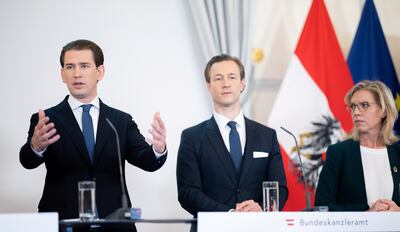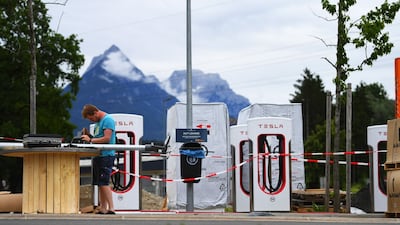Every adult in Austria will be paid at least €100 ($116) in an annual “climate bonus” to meet the costs of switching to cleaner energy.
The handout is meant to compensate for a new €30-per-tonne carbon tax which ministers hope will steer people towards climate-friendly heating and transport.
The bonus will rise to €200 for people cut off from public transport in Austria’s rural hinterlands, while families with children will get a bigger cheque.
The reforms were championed by Austria’s Green party, which is part of the governing coalition in Vienna, and will take effect in 2022.
Vice-Chancellor Werner Kogler, a Green cabinet member, said the changes would lead to “less dirt in the air but more money in people's pockets”.
“The more climate-consciously you behave, the more of the bonus will be left over,” said Green tax spokesman Jakob Schwarz.
“There’s been talk about carbon pricing in Austria for 30 years. Now we’re finally doing it and climate-friendly decisions will finally be rewarded.”
Environmental groups gave a more lukewarm verdict. The World Wildlife Fund said the carbon tax was an important step but that the rate was too low.
“At the moment it is a weak compromise that urgently needs to be improved,” said WWF Austria spokeswoman Hanna Simons.
The price will rise to €55 by 2025, with ministers hoping to generate about €5 billion by then. Mr Kogler said that “setting out on the path is more important than where the price is set initially”.

Greenpeace described the reforms as “too weak, too late and ineffective”. It said the higher prices would not be noticeable at petrol stations.
“The government’s tax reform has failed to put Austria on a good climate course,” said Greenpeace spokeswoman Sophie Lampl.
“It is a damning indictment that Austria can’t put forward a more climate-friendly model than conservative Germany.”
Carbon incentives in Europe
Germany this year brought in a carbon tax for companies in the petrol, diesel, natural gas and heating sectors.
The German government collects €25 per tonne for a pollution licence, under an emissions trading system which sits alongside an EU equivalent.
Berlin does not pay the money back directly to German taxpayers, but says it will use the funds to invest in green initiatives and cut electricity prices.
Sweden brought in a climate bonus in 2018 to reward people who buy electric cars. They can be paid up to 70,000 kronor ($8,020).
The scheme has proved so popular that funding for this year ran out early, meaning the Swedish government had to suspend payments.
Some campaigners have compared a climate bonus to the idea of a universal basic income. In Britain, there have been calls from left and right for a climate dividend to help people go green.
The UK government has said it is watching other countries’ plans with interest and wants public support in the race to net zero.
The UK’s energy policy was thrown into the spotlight by a run on fuel which led to petrol stations having to close forecourts.
Prime Minister Boris Johnson announced on Monday that he wanted all UK electricity to come from renewable sources by 2035.
He suggested that this would be good for energy bills because Britain would not be dependent on fluctuating oil and gas prices.
“We will be reliant on our own clean power generation which will help us also to keep costs down,” he said.


